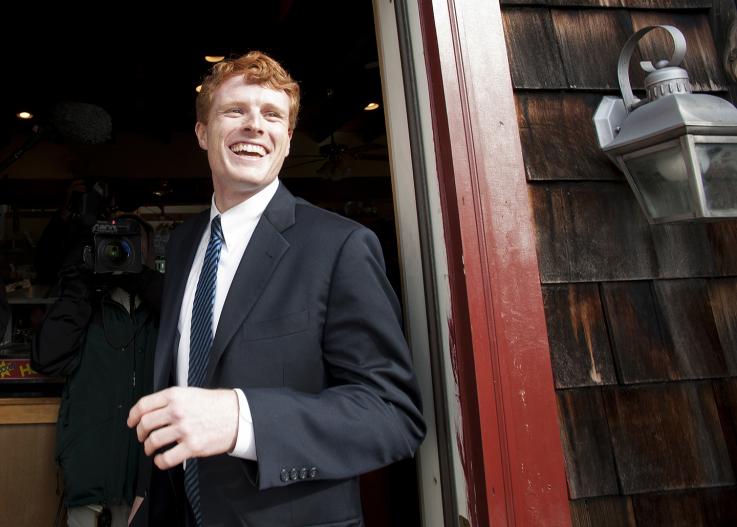喬·肯尼迪三世
I wish it were easy to change human nature. Fear motivates, but hope does too. One person who regularly activates that idea is John Lewis, representative for Georgia, our most optimistic member of Congress. There is not an elected official who has been let down more often by people than he has—people who should know better and have his best interests at heart. He’s been arrested over 40 times and beaten and nearly killed. Yet he has lived, seen, fought and bled for the ability of the United States to change and become a more perfect union. There is value in that fight and pursuit.
我希望改變?nèi)诵允羌菀椎氖隆?謶质莿恿ΓM彩恰N覀冏顦酚^的國會議員喬治亞州代表約翰·劉易斯經(jīng)常提出這個(gè)想法。沒有一個(gè)民選官員比他更經(jīng)常讓人民失望——人民應(yīng)該更了解他,將其最大利益放在心上。他被逮捕40多次,被毆打,差點(diǎn)被殺。然而,他為美國的改變和成為一個(gè)更完美的聯(lián)邦而生活、見證、戰(zhàn)斗和流血。奮斗和追求是有價(jià)值的。

Lewis was at a memorial service for the Mother Emanuel church shooting in Charleston, South Carolina, listening to family members who had lost loved ones speak, and he got up and talked about forgiveness. He said that our nation had learned to forgive, and he told a story about how, when he was 21, he was beaten by Ku Klux Klan members in South Carolina. Years later, a man came into his congressional office with his son and asked for him. He said that he was one of the members of the Klan who had beaten him, and that he had come with his child to apologize. They hugged, and both cried.
路易斯當(dāng)時(shí)在南卡羅來納州查爾斯頓的伊曼紐爾母親教堂槍擊案的追悼會上,聽著失去親人之人的講話,他站起來,談?wù)撝鴮捤 Kf,我們國家已經(jīng)學(xué)會了寬恕,他還講述了他21歲時(shí)如何在南卡羅來納州被三K黨成員擊敗的故事。數(shù)年后,一個(gè)男人帶著兒子來到國會辦公室,要求見他。他說,這是毆打他的三K黨成員之一,他帶著孩子前來道歉。他們擁抱并垂淚。
To continue to get up and fight and to always say, “Hello, brother,” the way he does, shows that we are human, we are fallible and we make mistakes. We have the capacity to resist fear and be strong. We as individuals have a choice to make, and our country’s history shows that in those real times of crisis, we do try to be big and bold. When our Founding Fathers wrote that all men were equal, they meant rich, white Protestant men. We have worked to expand that. To help people like the poor migrants who come here seeking a better life, as my family did when we first got here.
為繼續(xù)站起來戰(zhàn)斗,他總說,“你好,兄弟,” 他的方式,表明我們是人,我們?nèi)菀追稿e(cuò),我們會犯錯(cuò)誤。我們有能力抵抗恐懼,變得堅(jiān)強(qiáng)。我們每個(gè)人都有自己的選擇,我們國家的歷史表明,在那些真正的危機(jī)時(shí)刻,我們確實(shí)努力做大、更勇敢。當(dāng)我們的開國元勛寫道,所有人都是平等的,他們指的是富有的白人新教徒。
When faced with someone speaking out of fear, call it out. Speak up. Ask the fundamental question, “Why do you feel that way?” Listen to those answers to expose the fallacy of their argument, so that you can address that underlying fear. If people are willing to have an honest conversation around, say, immigration, they might say, “We can’t afford it,” or “It’s going to displace us.” Those are statements you can engage in. Be tenacious enough to not let the argument die.
當(dāng)碰到某人因害怕而說話時(shí),大聲說出來。說出來。問最基本的問題,“你為什么這么想?”聽那些答案,揭露他們論點(diǎn)的謬誤,這樣你就能消除潛在的恐懼。如果人們愿意坦誠地談?wù)撘泼駟栴},他們可能會說,“我們買不起,”或者“它會取代我們。”這些都是你可以參與的陳述。要足夠堅(jiān)韌,不要讓爭論消失。
Countering alternative realities with facts is hard. But it isn’t any harder than it was for African-Americans in the civil rights movement or for the women who fought for suffrage.
用事實(shí)處理不同情況的現(xiàn)實(shí)是困難的。但這并不比民權(quán)運(yùn)動中的非裔美國人或爭取選舉權(quán)的婦女的處境更難。
The grandson of Robert F. Kennedy is a lawyer and has been the U.S. representative for Massachusetts’s 4th Congressional District since 2013.
羅伯特·F·肯尼迪的孫子是一名律師,自2013年以來一直擔(dān)任馬薩諸塞州第四國會選區(qū)的美國眾議員。
譯文由可可原創(chuàng),僅供學(xué)習(xí)交流使用,未經(jīng)許可請勿轉(zhuǎn)載。












